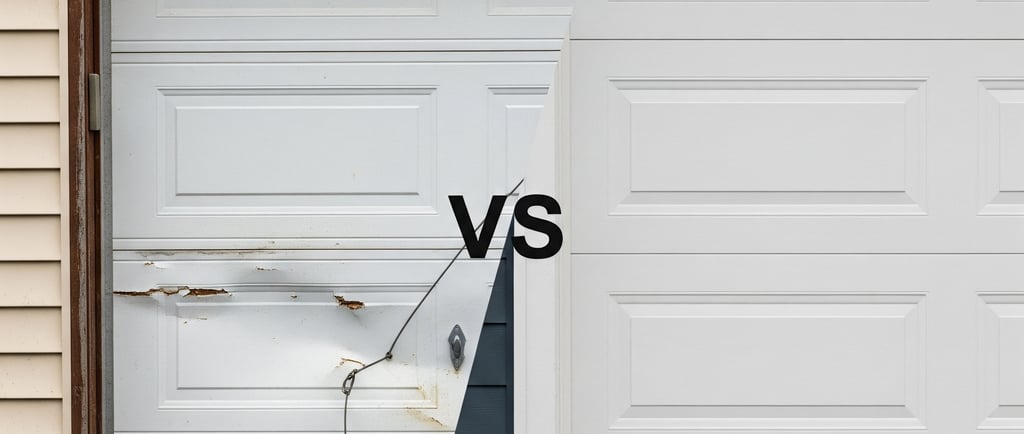When to Repair vs. Replace Your Garage Door: A Homeowner's Guide
Is your aging garage door showing signs of wear, or has it suffered significant damage? Deciding whether to repair or replace your garage door can be a tough choice. This guide will walk you through the key factors to consider, helping you understand when a professional repair is sufficient and when it's time to invest in a brand-new door for enhanced safety, curb appeal, and long-term value.
7/12/20252 min read


Introduction: Assessing Your Garage Door
Your garage door is an essential element of your home, providing convenience, security, and curb appeal. However, as it ages, wear and tear become inevitable. If your garage door is showing signs of damage or simply not functioning as it should, you may find yourself facing a difficult decision: should you repair it or replace it entirely? This guide will help you navigate this crucial choice.
Signs That Repair May Be Sufficient
Before rushing to purchase a new garage door, assess the condition of your current one. Minor issues can often be resolved with a simple repair. Common signs that a repair might be sufficient include:
Noisy Operation: Squeaking or grinding noises might indicate that the door needs lubrication or that a component is wearing out.
Slow Response: If your garage door is operating slower than usual, it could be a sign of a faulty opener that can be repaired rather than a complete replacement.
Uneven Closing: A door that doesn’t close or open evenly might just need an alignment adjustment and not a full replacement.
Cosmetic Issues: Dents, scratches, or peeling paint can often be fixed with touch-ups without needing to discard the entire door.
If your garage door exhibits any of these problems, consulting a professional for repairs may be a good first step.
When to Consider Replacement
In some cases, repairing your garage door may not be viable, particularly if the damage is extensive or if the door is aging significantly. Here are several scenarios where replacement becomes the more beneficial option:
Severe Damage: If the door has suffered from severe damage due to an accident or weather conditions, structural integrity may be compromised, and a replacement is often safer.
Frequent Repairs Required: If you find yourself constantly fixing issues, it might be more cost-effective to invest in a new garage door rather than continually repairing an old one.
Outdated Technology: Modern garage doors often come with enhanced security, insulation, and energy efficiency compared to older models. Investing in new technology can provide long-term savings.
Improved Curb Appeal: A fresh and modern garage door can significantly enhance your home's overall appearance and value.
Assessing these factors can help you understand whether it's time to invest in a replacement or continue with repairs.
Conclusion: Making the Right Decision
Determining whether to repair or replace your garage door can be challenging. Take time to evaluate the condition of your door, the frequency of repairs needed, and the technologies available in new garage doors. Ultimately, whether you choose to repair or replace, prioritizing safety and functionality will ensure your garage door continues to serve its essential role for years to come.

